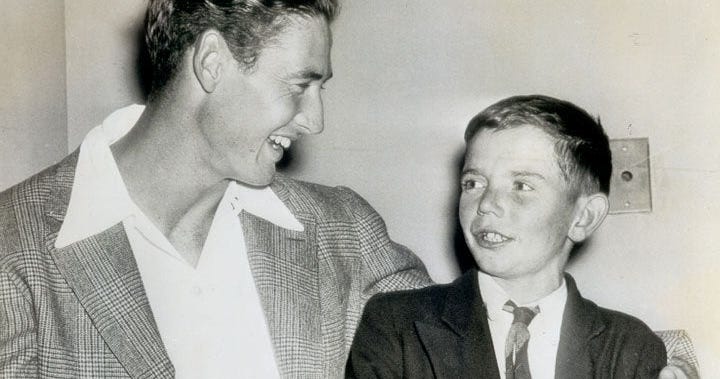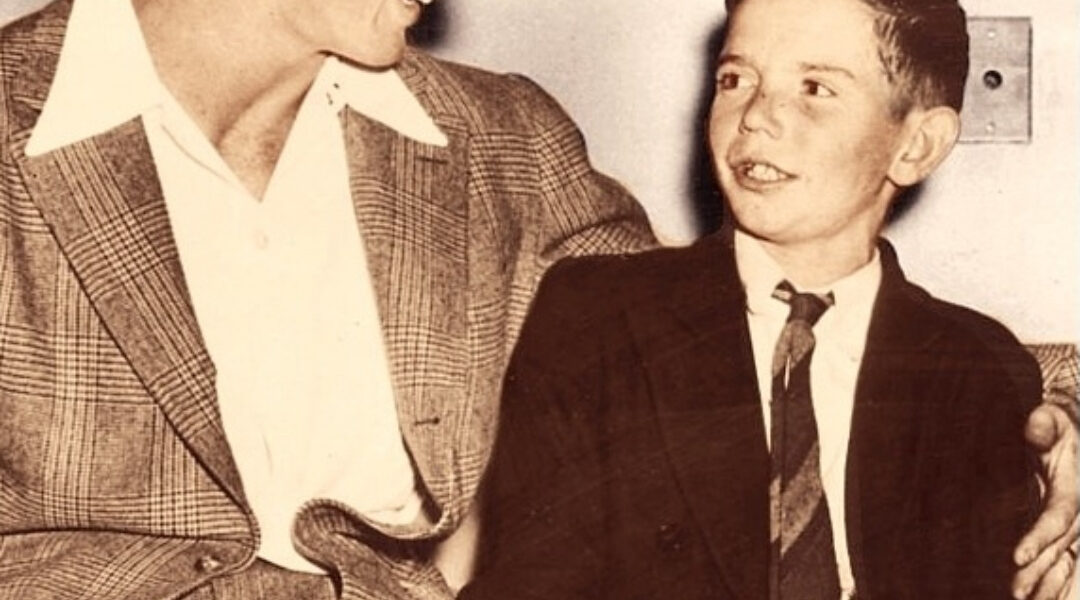In the summer of 1941, baseball fever gripped America — and for one 14-year-old boy named Billy Kane, it was everything. Living in Maine, Billy followed every game, every headline, and every swing of his hero, Ted Williams, the rising superstar of the Boston Red Sox. To Billy, Williams wasn’t just a great player — he was larger than life, the embodiment of everything a young dreamer could hope to be.

There was just one problem: Boston was 250 miles away, and Billy had no way to get there. His family couldn’t take him, and money was tight. But when you’re fourteen and full of hope, impossibility doesn’t exist. So one morning, clutching a small bag and his faith, Billy stuck out his thumb and began hitchhiking toward Fenway Park.
It was a long, exhausting journey — hours of waiting on dusty roads, the hum of passing cars, and the occasional kind stranger who offered a ride. But by September 2nd, he made it. His heart raced as the Boston skyline came into view. Fenway Park — the field of his dreams — was just ahead.
But when he got there, Billy’s excitement crashed into disappointment. The Red Sox weren’t playing that day. The stadium gates were closed, quiet, lifeless. It was a team off-day.

For a moment, Billy just stood there, staring at the empty ballpark. But he refused to give up. He decided to stay — to wait — because the Yankees were coming into town for a four-game series. Maybe, just maybe, he’d get a glimpse of Ted Williams then.
That night, with nowhere to go, he wandered into one of Fenway’s aisles and lay down on the hard seats. The sound of the city faded into the hum of crickets and passing cars. He drifted to sleep under the stars — a kid far from home, clutching nothing but his dream.
But around midnight, the echo of footsteps woke him. Two police officers on patrol had found him curled up in the stands. They gently woke him, asking what he was doing there. Billy, bleary-eyed and honest, told them everything — about his long trip, about his hero, about how all he wanted was to meet Ted Williams.

The officers exchanged looks, half amused, half moved. They decided not to send him away. Instead, they brought him to the local precinct, where more officers gathered to hear the story of the boy who had hitchhiked 250 miles just to meet his idol.
Someone had an idea. “Williams is staying at the Shelton Hotel,” one of the officers said. “Let’s go tell him.”
And so, sometime after midnight, a few policemen made their way to the hotel and knocked on Ted Williams’s door. The slugger, already in bed, answered groggily — until he heard about the boy.
A kid from Maine had hitchhiked all the way to Boston just to see him.
Without hesitation, Williams threw on some clothes, grabbed his jacket, and went with the officers back to the station.
When he walked through the door, Billy couldn’t believe his eyes. There he was — Ted Williams himself, tall, smiling, larger than life. For a long moment, Billy couldn’t even speak. Then, finally, he managed a trembling, “Mr. Williams?”
Williams grinned and put a hand on his shoulder. “You came a long way to see a ballgame, kid,” he said. “How about you come to the next one as my guest?”
The next day, Billy sat in the stands of Fenway Park — not as a nameless fan, but as Ted Williams’s special guest. He watched his hero play, met the team, and even walked the field before the game.
By the time the story hit the newspapers, America had fallen in love with it — a simple tale of determination, kindness, and the bond between a boy and his hero.
Ted Williams went on to finish that season with a .406 batting average — one of the greatest feats in baseball history. And somewhere in the crowd that day was a 14-year-old boy who learned that dreams, no matter how far they take you, are always worth chasing.




